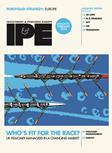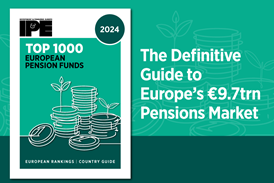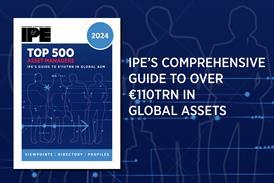All IPE articles in October 2022 (Magazine)
View all stories from this issue.
-
 Features
FeaturesCan a sinking market re-emerge?
Travelling around Sri Lanka in mid-July reminded me of Winston Churchill’s saying that “democracy is the worst form of government – except for all the others that have been tried”. Many in Sri Lanka would argue that the post-independence history of the country may have proved him wrong. This year, political upheavals after popular demonstrations caused the administration of President Gotabaya Rajapaksa and his elder brother, Prime Minster Mahinda Rajapaksa, to collapse after the Rajapaksas’ deep corruption and deeper ineptitude over two decades brought economic ruin as the country ran out of foreign exchange to pay for fuel imports.
-
 Interviews
InterviewsNEST Sammelstiftung: A history of sustainable investing
Ulla Enne (pictured), head of responsible investing and investment operations at Switzerland’s NEST Sammelstiftung, talks to Luigi Serenelli about the pension fund’s central focus on sustainability
-
 Features
FeaturesMarket overview: German institutional investors manage uncertainty
At mid-year 2022, the volume of Spezialfonds – the German vehicle for professional investors – administered on Universal Investment’s platform was €498bn, a rise of around 5% year on year. On a six-month basis, however, and compared with the end of the booming stock year 2021, asset volumes were down around 3%.
-
 Country Report
Country ReportFrance: First-pillar pension reform faces impasse
The French state faces growing expenditure on pension but attempts to reform the system have stalled
-
 Opinion Pieces
Opinion PiecesESG Viewpoint: The genius of SFDR - requiring ordinal disclosure is so much more than a label
When the EU originally announced its High-Level Action Plan for Sustainable Growth in 2018, its intended eco-label received a lot of attention. Many considered the Sustainable Finance Disclosure Regulation (SFDR) a boring, administrative matter. Labels are shiny commonplace symbols hyped by corporate marketing teams around the world to instil a feel-good factor in retail consumers and bolster the defensibility of institutional buyer decision making. Required Ordinal Disclosure (ROD) is a technocratic idea whose genius has remained largely unrecognised to date.
-
 Asset Class Reports
Asset Class ReportsEmerging market debt report
This year has seen hefty losses on the main emerging market debt indices, in both hard and local currency denominated bonds. Investors are left assessing whether these price moves are justified. Or has the market overreacted to US rate rises and the war in Ukraine, leaving markets as a whole underpriced?
-
 Interviews
InterviewsOn the record: Emerging market debt
At a time of high volatility in interest rates, currencies and GDP, two seasoned investors in emerging market debt discuss their approaches
-
 Features
FeaturesPension funds continue their focus on ESG social issues
Before the year is over, European policymakers are expected to announce their decision to shelve plans for a social taxonomy.
-
 Opinion Pieces
Opinion PiecesUS: Transparency concerns over SEC private market disclosure rules
Will the US Securities and Exchange Commission’s (SEC’s) new climate risk reporting rules bring more transparency to private markets? Or will they have the unintended consequences of increasing the opacity of the markets?
-
 Features
FeaturesIASB's management commentary project faces identity crisis
Any regular follower of the International Accounting Standards Board is probably familiar with a particular recurring nightmare. It starts with good intentions but spirals into shifting project goals, missed targets, and unquantifiable hours of wasted time. Perhaps you awoke during July to find yourself observing the board’s July discussion of its management commentary project.
-
 Features
FeaturesIPE Quest Expectations Indicator: monthly commentary
Political risk has decreased. An attack in the north-east of Ukraine took the Russian army by surprise but did not cause collateral damage in Russia. Russians’ resistance to the war is mounting but far from a critical level. It looks like the EU will survive the winter without major energy disruption and caps on energy prices are falling into place.
-
 Asset Class Reports
Asset Class ReportsEmerging market debt: managers face choppy waters
Some see opportunities as investors have exited the asset class but emerging economies continue to face divergent trajectories
-
 Country Report
Country ReportFrance: Third-pillar pensions and sustainability take centre stage
Clémence Droin, senior engagement manager at Indefi, talks to IPE about the two main areas of focus for the French institutional investment community lack of a regulatory push from pension reforms
-
 Opinion Pieces
Opinion PiecesSolvency II: Rule changes can’t force risk taking
Changing the rules can often seem like a very sensible policy choice – whether a sweeping deregulatory reform or more of a technocratic adjustment to regulations.
-
 Opinion Pieces
Opinion PiecesGuest viewpoint: Let’s make ESG real, and call out the fakes
Environmental, social and governance (ESG) investing has become pretty much mainstream. At its ideological base is the belief that a capitalist economy and polity that seeks the well-being of its middle class can achieve positive change by mobilising investment flows – in particular, that environmental protection and social justice can come about by correcting where investments are channelled.
-
 Asset Class Reports
Asset Class ReportsEmerging market debt: China government bonds
The outlook for Chinese government debt is looking less attractive
-
 Country Report
Country ReportFrance: The biodiversity reporting enigma
France’s financial institutions must report on biodiversity impacts but face a lack of corporate data push from pension reforms
-
 Opinion Pieces
Opinion PiecesLetter from Berlin: The German way to supervise the EU Taxonomy
The German financial supervisory authority, BaFin, has chosen its own path to deal with the EU taxonomy – in particular when it comes to nuclear and gas.
-
 Opinion Pieces
Opinion PiecesAustralia: Role for superannuation in nation-building
A new Labor government has set the scene for change in Australia’s growing superannuation industry to ensure that some of the country’s A$3.3trn (€2,3trn) savings pool is directed toward social housing and the energy transition.
-
 Interviews
InterviewsInterview: Martin Præstegaard, ATP CEO
On the first day of September, Martin Præstegaard – who was installed little more than a month before as CEO of ATP – told journalists in the pension fund’s Copenhagen offices that ATP had made its biggest six-month investment loss ever.





